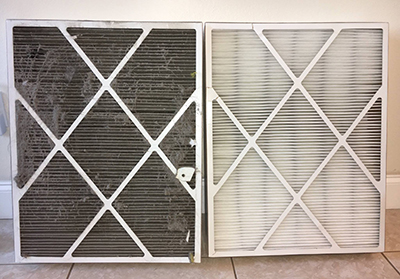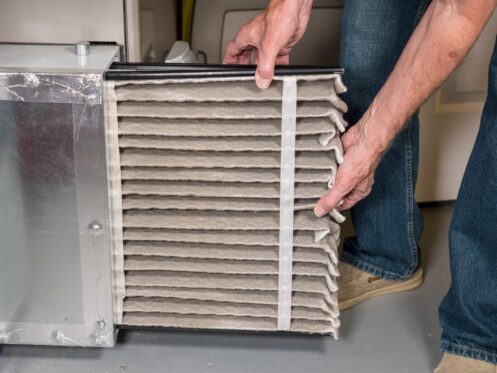Even though you can’t see it with the naked eye, indoor air plays a major role in a person’s ability to experience optimal health. That’s why it’s just as important to prioritize better habits surrounding indoor air quality. In the same way you’d develop a schedule to clean your home, implement the following tips to develop better indoor air quality this summer.
1. Clean Carpets and Rugs
If the floors of your home are covered by carpet and area rugs, maintain a strict cleaning schedule to help improve your indoor air quality. Carpeted floors carry a lot of allergens that directly impact the air you breathe. In the long run, it’s a wise decision to transition to hardwood, tile or other hard-surface flooring in order to create an environment that’s most conducive to higher-quality air. In the meantime, vacuum at least twice a week. By regularly cleaning the carpet, you’ll reduce the chances of bacteria and dust mites thriving inside the carpet fibers. Shampoo the carpets once a year to give your floor-cleaning efforts the best foundation.
2. Prioritize Humidity Reduction
As the temperatures rise in the months of summer, the humidity levels typically rise as well. Whether you’ve opened the windows or the children repeatedly come in and out of the front door, the outdoor humidity impacts the inside of your home. Purchase a humidity gauge in order to know where your humidity levels are in your home. If the humidity gets too high, this means there’s too much moisture in the air. Excessive moisture leads to breathing issues and the development and spread of harmful bacteria. In order to combat humidity in a space, turn up the air conditioner to add cool air into the space. Consider investing in a dehumidifier as well.
3. Eliminate Toxic Products
Volatile organic compounds are also known as VOCs. They’re known to cause great harm to the central nervous system, the eyes, nose and throat and more. This is why it’s very important to eliminate products that contain VOCs. Some of the most popular products that contain these compounds include cleaning supplies, candles and various personal care products.
Because VOCs are found in so many items that are vital to daily life, it’s important to decrease their presence in your home. VOCs are found in the gasoline you pump at the gas station, for example, but you need gas to get around. However, in your home, in place of traditional cleaning supplies, you can create your own out of natural ingredients like white vinegar, fresh lemon juice and baking soda.
4. Get Rid of Pesticides
Pesticides are contributors to health issues like headaches, nausea and allergies. They can also increase a person’s chances of getting cancer. The residue of pesticides doesn’t belong in the air of your home. To decrease their impact on your indoor air quality, avoid the usage of items like bug traps and sprays. Don’t keep items like rodent poison inside of your home.
Look for non-toxic versions of these products that can kill the critters without impacting your indoor air. Create adequate barriers to keep pests out (caulk windows, close leaks, etc). If you come across a spider or a fly, use a fly swatter to kill the bugs. Then, use a paper towel to discard the remains. You won’t need to release harmful chemicals into the air when you can simply use a manual method.
5. Change the Air Filters
If your home represents the body, the air filters of your HVAC unit are the lungs. As the cold air flows through the vents into the various rooms of the home, it goes through the air filters. Over time, the filters collect dust, allergens and debris. In order to maintain better indoor air quality, change the filters every 90 days. It’s wise to clean the filters once a month.
In order to clean the filters, turn off the HVAC unit and remove the filters. Then, either rinse them off outside or use a vacuum cleaner to suck up dirt and dust. If you’ve opted to wash them off with the outdoor hose, give them time to dry. If you’d like to release a toxin-free scent through the air, add a couple of drops of essential oil to the air filters.

Once the filter is put back into the HVAC unit, the cold air will pick up the scent and carry it throughout the home. Essential oils are also known to have restorative properties as well. Use an option like eucalyptus that’s known to be good for the respiratory system.
6. Regularly Use the Vents
While it’s really nice to enjoy the nostalgic aroma of good cooking in the kitchen, it can have adverse effects on the indoor air quality of your home. Depending on what you’re cooking and the type of oil you’re using, cooking can produce VOCs. In order to decrease the negative impact on the air, use a range hood or vent each time you’re cooking on the stove. This is a great way to stay on top of air circulation and proper ventilation.
Whenever you’re taking a steamy shower or bath, turn on the vents as well. The vents are the best way to directly decrease the moisture and humidity in the room. While steam is helpful in smaller doses, use vents to decrease the chances of moisture turning into mold or bacterial spread.
7. Use Air Quality Machines
Invest in indoor air quality machines like a humidifier, a dehumidifier and an air purifier. Depending on the direction of the humidity in your home, you can use a humidifier or dehumidifier. If you’d like to directly reduce the amount of pollutants in the air, use an air purifier or a portable air cleaner. If you’re struggling with the air quality in one or two rooms of the house, purchase smaller options for those areas. However, if you’d like to improve the air quality in the entire home, invest in a whole-home air purifier.
8. No Smoking Indoors
Even above the harmful VOCs, nothing decreases indoor air quality quite like smoking does. Whether you’re smoking tobacco or another substance, be intentional about doing so outside of the home. Even for the non-smokers who live in the home, secondhand smoke still has adverse effects on everyone’s quality of air and their health.
In addition to working towards eliminating a smoking habit, know that smoking is extremely hazardous to one’s health as it stands as the biggest contributor of pollutants to a residential space as it can impact the way the internal organs function. It can also increase the risk of a heart attack.
As you turn the air conditioner on this summer, be mindful of the way it operates and how it impacts your indoor air quality. A company like F.F. Hitchcock Plumbing, Heating & Cooling is able to provide cooling services like AC repair, air conditioner maintenance, and cooling installation in order to ensure cool, clean air permeates through your home. Consider our services for ductless mini splits, drain cleaning and fixture replacement to keep the air you breathe inside this summer cool and clean.







